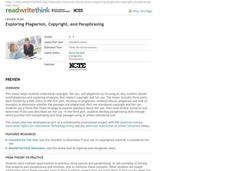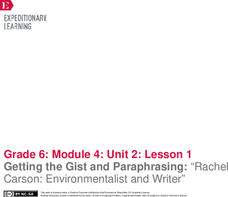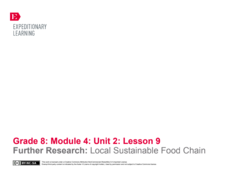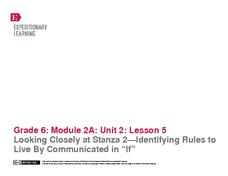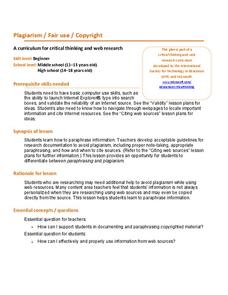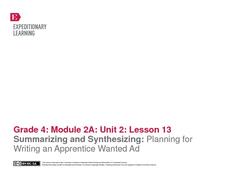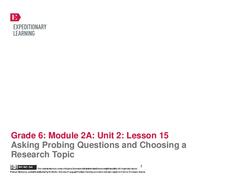Houghton Mifflin Harcourt
Walt Whitman: From Song of Myself
Looking for a resource that models how to read and analyze a poem? Check out this packet that uses sections of Walt Whitman's "Song of Myself" to demonstrate how to paraphrase, note literary elements, and identify the poet's inferences.
K20 LEARN
Unlocking Answers: Keys to Great Research
Successful searches for information require more than just a device with Google access. Young researchers learn how to use keywords and hashtags, as well as how to evaluate sources and how to paraphrase without plagiarizing in a fun...
ReadWriteThink
Exploring Plagiarism, Copyright, and Paraphrasing
Plagiarism, copyright, and fair use are the focus of a three-part instructional activity designed to inform scholars of how to properly cite others' work. First, pupils use a KWL chart to begin thinking and discussing plagiarism. They...
Baruch College Writing Center
Summarizing, Paraphrasing, and Quoting Workshop
What's the difference between summarizing and paraphrasing? Show class members how to find the main ideas from informational text and condense it, restate it, or quote it directly with a series of educational activities based on two...
K20 LEARN
To Ban or Not to Ban? Intellectual Rights and Responsibilities: Banned Books, Censorship Part 2
After examining different perspectives on book banning, scholars select a book from a list of frequently banned books and research the controversies surrounding it. They then craft an argument about their chosen book, including arguments...
EngageNY
Getting the Gist and Paraphrasing: “Rachel Carson: Environmentalist and Writer”
Don't copy me. Scholars prepare to dig in with an introduction to their research folder and a discussion about plagiarism. They then review the meanings of harmful and beneficial and how the words apply to the use of DDT. They finish the...
EngageNY
Further Research: Local Sustainable Food Chain
Researchers review how to create citations, find reliable sources, and paraphrase. Next, using guided task cards and their researcher's notebooks, they investigate the question they developed in instructional activity eight about the...
EngageNY
Research: Paraphrasing Relevant Information
Readers take a look at the source Ethical Style: How Is My T-Shirt Made? and discuss how to say the information in the article without plagiarism. Learners make note of and underline sentences that may present a problem in paraphrasing....
EngageNY
Paraphrasing and Evaluating Sources: Pages 112–116 of The Big Thirst
Agriculture and water—it's a fine balance. So how exactly do industry and agriculture currently manage water? Pupils consider the question as they continue reading excerpts from Charles Fishman's The Big Thirst and adding notes to their...
EngageNY
Looking Closely at Stanza 2—Identifying Rules to Live By Communicated in “If”
Pupils take part in a close reading of the poem, If by Rudyard Kipling, in which they delve deep into its meaning and identify its rules to live by. As the grand discussion progresses, learners then relate the poem's rules with those...
EngageNY
Paraphrasing Quotes and Analyzing Visual Elements, Part 2: Investigating the Scientific Method with Max Axiom Super Scientist
Solve the world's problems. Class members move on to section two of Investigating the Scientific Methods with Max Axiom Super Scientist and complete a similar activity as in the previous lesson plan. Next, they carry out a first read to...
Student Achievement Partners
"The Glorious Whitewasher" from The Adventures of Tom Sawyer by Mark Twain with Mini-Assessment
It's the classic scene: Tom Sawyer is whitewashing a fence. Expose your learners to Mark Twain's humor while reinforcing reading comprehension. Eighth graders are encouraged to read and reread, achieving as much exposure to the text as...
Overcoming Obstacles
Writing Reports
Following a review of how to research and take notes, scholars define the term paraphrase and identify ways to organize information and finish reports. To put their newfound knowledge to the test, learners interview a peer, take notes,...
Daughters of the American Revolution
Lesson 2: How Do We Determine the Value of Education?
Have women always had the same educational opportunities as their male counterparts? Young historians read an 1819 essay by Emma Willard on the state of female education in the 19th century before discussing their views regarding women's...
EngageNY
Using Quotes to Explain Relationships: How the Invention of Television Changed People’s Lives
Television changes the world. Scholars determine the gist of the video clip Television Takes the World by Storm and article How Do
Inventions Affect the Way We Live? They then do a second view and read to complete an Explanation Task...
EngageNY
Paraphrasing and Evaluating Sources: “Gaming Can Make a Better World”
Explore how gaming might make the world a better place. To dissect the statement, scholars watch video clips about the benefits of video games. While listening, pupils make notes in their researcher's notebooks, attempting to discern the...
EngageNY
Paraphrasing Quotes and Analyzing Visual Elements, Part 3: Investigating the Scientific Method with Max Axiom Super Scientist
Come again? Scholars repeat actions taken in the last two lessons using section 3 of Investigating the Scientific Method with Max Axiom Super Scientist. They first read the section to determine the gist and then carry out a second read...
Microsoft
Plagiarism Fair Use Copyright
Nothing makes junior high and high school teachers more frustrated than plagiarism. Instruct young writers about copyright laws and the correct ways to paragraph information without copying the exact words. A set of secondary-level...
Creative Visions Foundation
Introduction to the Universal Declaration of Human Rights
Many people don't realize that all people on the planet are entitled to certain inalienable rights. Scholars discuss the subject with the first of four lessons in the Introduction to the Universal Declaration of Human Rights series....
EngageNY
Researching Digital Sources, Part 1: Guided WebQuest
We are living in a technical world. Scholars learn how to examine digital resources for their research on DDT. They explore a list of websites using a Digital Resources on DDT sheet. Learners examine their research notebook to determine...
Personal Genetics Education Project
Introduction to Personal Genetics
Adolescents have the opportunity to consider how they feel about the possibilities presented by the current availability of genetic sequencing. After some instruction, they participate in a four-corners activity in which you read a...
Hampton-Brown
From "First Crossing"
Young scholars look closely at four tales taken from the collection of short stories, First Crossing edited by Donald R. Galloby. While examining the life of four teenagers and the lives they lead as U.S. immigrants, your enthusiastic...
EngageNY
Summarizing and Synthesizing: Planning for Writing an Apprentice Wanted Ad
In instructional activity 13 of this unit on colonial trade, young researchers learn about apprentices as they prepare to write help-wanted ads for the specific trade they have been researching. To begin, the class listens closely as the...
EngageNY
Asking Probing Questions and Choosing a Research Topic
Begin the writing journey of an evidence-based essay detailing a rule to live by with various activities to familiarize learners with the topic and jump-start brainstorming. First, pupils take part in an in-depth review and discussion of...




